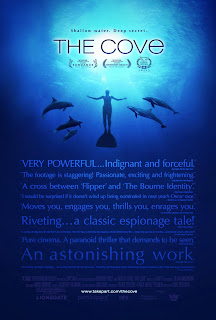Am away for CDC Regional Combined camp 2010 for 4 days 3 night last week, which means works are piling up on my desk... and hopefully it justify why i didn't post any blogs for the past 2 weeks (ok maybe i am just plain lazy).
Anyway, cried a river last Sunday while watching a movie called "The cove". Please do watch the movie if you never heard about it before. It will change your perspective towards animal care as well as humanism all together. The cove is a documentary movie which talks about a man called Ric O Barry and his journey of transformation from training dolphin in captivity (for a famous TV series "flippers" in 1960's) to assertively combating the captivity industry.
"In a sleepy lagoon off the coast of Japan lies a shocking secret that a few desperate men will stop at nothing to keep hidden from the world. The Cove exposes the slaughter of more than 20,000 dolphins and porpoises off the coast of Japan every year. Begins in Taiji, Japan, where former dolphin trainer Ric OBarry has come to set things right after a long search for redemption. In a remote, glistening cove, surrounded by barbed wire and Keep Out signs, lies a dark reality. It is here, under cover of night, that the fishermen of Taiji, driven by a multi-billion dollar dolphin entertainment industry and an underhanded market for mercury-tainted dolphin meat, engage in an unseen hunt.
Undeterred, OBarry joins forces with filmmaker Louis Psihoyos and the Ocean Preservation Society to get to the truth of whats really going on in the cove and why it matters to everyone in the world. With the local Chief of Police hot on their trail and strong-arm fishermen keeping tabs on them, they recruited an Oceans Eleven-style team of underwater sound and camera experts, special effects artists, marine explorers, adrenaline junkies and world-class free divers who will carry out an undercover operation to photograph the off-limits cove, while playing a cloak-and-dagger game with those who would have them jailed. The result is a provocative mix of investigative journalism, eco-adventure and arresting imagery that adds up to an urgent plea for hope."
Commercial whaling has been outlawed worldwide since the mid-1980s, but that prohibition has not been extended to smaller cetaceans, or marine mammals, like dolphins, in large part because of Japan’s opposition. As a result around 21,000 dolphins are killed there each year, according to Japanese government estimates, in places like Taiji, a small seaside town south of Osaka where most of "The Cove" was filmed (http://www.nytimes.com)
Further to release of the movie, critical praise and audience awards worldwide have focused international attention on Taiji and the annual dolphin drives off the coast of Japan. Under intense pressure, Taiji called for a temporary ban on killing bottlenose dolphins. The film, which was originally rejected, was shown at the Tokyo Film Festival due to public outcry. Residents in Taiji are being tested for mercury poisoning, and for the first time Japanese media are covering the issue.
Further to release of the movie, critical praise and audience awards worldwide have focused international attention on Taiji and the annual dolphin drives off the coast of Japan. Under intense pressure, Taiji called for a temporary ban on killing bottlenose dolphins. The film, which was originally rejected, was shown at the Tokyo Film Festival due to public outcry. Residents in Taiji are being tested for mercury poisoning, and for the first time Japanese media are covering the issue.
The fisherman are clearly rattled, but haven’t stopped killing dolphins (http://www.telegraph.co.uk/earth/6255789/Sea-of-blood-as-Japan-slaughters-thousands-of-dolphins.html)



2 comments:
ohhhhhhhh sounded nice..:)
did you change something about your blog? eyes are hurting lar.
Post a Comment